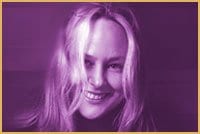Lisa Voldeng once wrote an editorial on same-sex marriage that resulted in a prominent Calgary Conservative proposing that the term “marriage” be used exclusively by the church for church-recognized unions, leaving government to administer legal unions, gay or straight. That editorial is being used as supporting evidence in a case currently before the US Supreme Court.
Voldeng, 36, is now a candidate for the Work Less Party, in the Vancouver-Burrard riding. She’s running this election to demonstrate to the apathetic “that people have choices and can exercise that choice to create the life we want. I have a voice and it was time for me to use it.”
This is her first run for political office. She sees it as an opportunity to articulate some of her ideas “and speak in service of something larger.” Voldeng doesn’t have much respect for the political status quo.
She has been an advisor to industry, an analyst/futurist who advises corporations on “where the future is going and how to adapt their business.”
Now, she’s an entrepreneur who believes the country can still be productive with a shortened workweek. “People just have to work smarter, not harder,” she says.
The Work Less Party is focused on “revisiting and revising the workweek to 32 hours.” Most people want a higher quality of personal life, she points out. “They don’t want to be living to work. Workaholism is dysfunctional personally, culturally and environmentally.”
It’s in the best interests of major corporations to change the way they conduct business, Voldeng believes, “for themselves and for the planet.”
Voldeng describes herself as “an entrepreneur seeking to create a system of socially-responsible capitalists. It’s got to come from the business community,” she says.
The queer business community, in particular, should do more to support the community’s youth, she says, both financially and through mentoring. “We need to look at business alliances to form, getting youth into a business environment where they’re learning a sense of self-value so they can make choices for their futures.”
Voldeng values her position on the Gay & Lesbian Business Association’s board of directors. “They’re a wonderful group of people who contribute and give back to the community.”
She and her partner moved from San Francisco to Vancouver after Sept 11, 2001, because “I didn’t like the way the traditional media world was evolving.”
Before that date, she travelled in international power circles conducting business. “I knew people who died in the [World Trade Center] towers,” she notes. “It was the right time to come home to be with the people we love in a country that’s so much more progressive.”
Recently, Voldeng was an invited guest at Alvin Toffler’s Future Shock anniversary forum where business, government and military leaders debated emerging political, economic, social and technological developments. “We represented two world views, the dying, white male reactionary and the emerging progressive. Many of us left with a renewed sense of hope, feeling we could choose a better way of being, not only personally, but also collectively.”
The bottom line in this election for Voldeng “is that in a world where 70 percent of the population has never made a phone call, I realized I could no longer lull myself with the illusions of the fear-driven consumer culture. I’m one of many who chose to wake up, to be accountable to myself, to my world, and to place the dignity and respect all beings deserve ahead of the sleep of illusion.
“I ask you simply to choose what you value and to honour what you value by choosing to vote.”

 Why you can trust Xtra
Why you can trust Xtra


